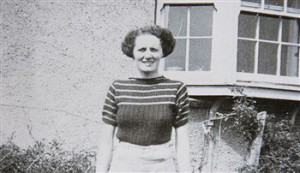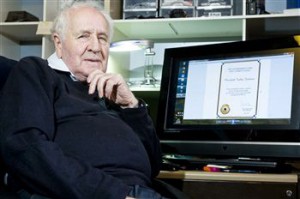By Neil Pooran
BRITAIN’S spy chiefs today (Fri) honoured a Scotswoman who helped crack Nazi coded messages – while posing as a small town shopworker.

Lizzie Young has been posthumously recognised by GCHQ for her efforts to intercept German radio signals during the Second World War.
She carried out her top secret, vital work while convincing all around her she was a sales assistant at a radio shop in Haddington, East Lothian.
Even her husband, Jack Tully-Jackson, was blissfully unaware of her secret war time role for years after they married.
The unlikely spy, who died last February aged 93, was today awarded a certificate for her wartime role, signed by the Prime Minister.
Mr Tully-Jackson, 87, said his wife’s boss at the radio shop, William Amos, had trained as a radio operator at Leith Nautical

College before the First World War, and was quickly identified by MI5 as a potential recruit.
Mr Amos ran Amos Radio and Electrical Supplies in Market Street, Haddington.
He agreed to help the war effort, and was told he could not operate without an assistant to cover for him. He immediately suggested his sales assistant, Lizzie.
The pair had to sign the Official Secrets Act, meaning they would not be able to talk about their experiences for 30 years.
Mr Tully-Jackson said his wife suffered criticism from locals at the time for not doing more to help the war effort.
He said: “She had to take a lot of abuse in the shop – why wasn’t she away when she should have been in the services or on war work? She just had to bite her lip and say: ‘Well, they haven’t sent for me yet.’”
Her main role was to make sure no-one discovered the true work going on inside the store. As well as running the shop day-to-day, Lizzie skillfully deflected any enquiries about what Mr Amos was up to upstairs.
Lizzie met her future husband in 1943, when Mr Tully Jackson was stationed at nearby RAF Macmerry.
Remarkably, she kept her obligations under the Official Secrets Act for the full 30 years before telling her husband.
He said he ‘had inklings’ over the years that his wife had been involved in some kind of secret work, but was never certain until after the 30 years had expired.
He said: “It just emerged gradually, she didn’t say: ‘Sit down, I’m going to tell you something.’
“She talked quite openly about it after the 30 years were up.”
Mr Amos died before the 30 years expired, and so never spoke about his work, but in recent years Mr Tully-Jackson, a historian, contacted his son and grandson to find out more about him and gave a presentation at Bletchley Park, the National Codes in Milton Keynes.
After that, he discovered that staff who worked at Bletchley Park or did related work were entitled to formal recognition and wondered if his wife would be eligible.
He said: “I looked at the Bletchley Park website and discovered that they had made an award to people down there and I thought ‘Why can’t we get the same thing for Lizze?’ but unfortunately it was a little after Lizzie passed away.
“I wrote to GCHQ and almost by return we got the award without any hassle at all.
“It’s a certificate signed by the Prime Minister and a lapel brooch that’s got a motif of a wheel of an Enigma machine.”
He said he thought his wife would have appreciated the recognition.
He said: “I’m very proud of her, and my family are too.
“I think she would have had a laugh at the whole thing, really, it took 70-something years.
“She would have enjoyed the craic.”

